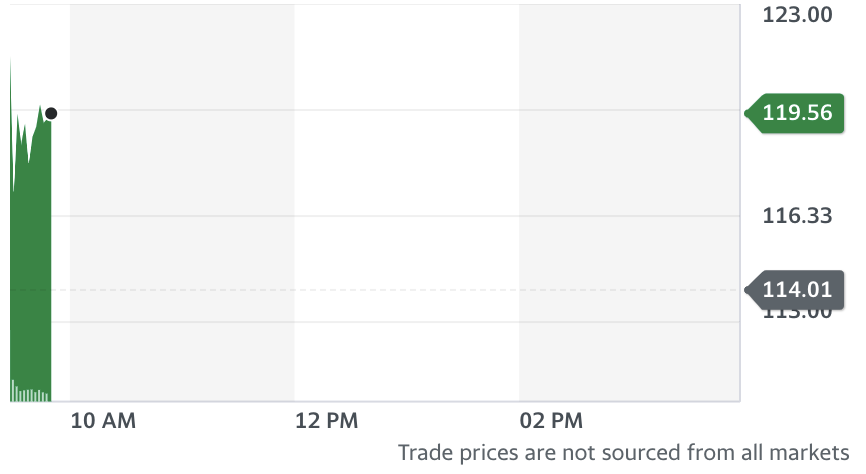UK approval of world’s first mRNA COVID-19 vaccine sparks hope of a drug revolution
WATCH: UK first in the world to approve BioNTech/Pfizer vaccine
The UK became the first western country to grant emergency authorisation for a COVID-19 vaccine on Wednesday. It is the first time a vaccine based on revolutionary messenger RNA technology has ever been approved by a regulator.
The vaccine, developed by Germany’s BioNTech (BNTX) in partnership with US pharma company Pfizer (PFE), was granted approval by the Medicines and Healthcare Regulatory Agency (MHRA) on Wednesday. The agency said its decision was “based on a rolling submission, including data from the Phase 3 clinical study, which demonstrated a vaccine efficacy rate of 95%.”
“Messenger RNA is a new drug entity,” BioNTech co-founder and CEO Ugur Sahin told the media today. “However, it is the first molecule of life, it emerged many billions of years ago and every human and animal has messenger RNA in their cells.”
On a press call with journalists on Wednesday, Özlem Türeci, BioNTech co-founder and chief medical officer, said they were “delighted” with the MHRA approval.
READ MORE: UK approves BioNTech and Pfizer’s COVID-19 vaccine for use 'from next week'
“We have started immediately the process of delivering our vaccine and we expect that the roll out of the vaccine in the UK will happen within the next couple of days,” Türeci said.
In response to a question about whether the MRHA had rushed approval through, Sean Marett, BioNTech’s chief business and commercial officer said: “The MHRA has asked the same level of detailed questions as any other agency, and they have focused on efficacy, the tolerance of the drug, and the quality of production.”
READ MORE: BioNTech: The German company behind the potential first COVID-19 vaccine
“These three elements are key elements to any vaccine that any regulator will look into detail and I think the MHRA has been no different in this respect,” Marett added.
He said that the doses destined for the UK are currently being packed at the Pfizer facility in Belgium, ready for shipping.
The company is expecting US FDA approval in mid-December, and around that time as well from the European Medicines Agency.
Transporting the vaccine
The vaccine vials are packed in temperature controlled thermoboxes and fitted with trackers to monitor their temperature minute-by-minute.
The vaccine needs to be stored at -70C, which could create challenges for GP surgeries. However, BioNTech said that keeping it at -70C is only necessary for long-term storage over many months. It can be kept in the delivery thermoboxes at vaccine centres for up to 20 days and stored in a normal fridge up to five days.
“You can take vials from a vaccine centre, put them in a bag at 2-8C, and take them to the care homes where they can be administered to the patients there,” Marett said.
Each vial contains five doses, diluted with saline solution, which is “more than enough” to vaccinate five people, the company said. They must be used within six hours of opening.
What is mRNA?
The BioNTech vaccine is the first messenger RNA (mRNA) vaccine to ever be approved in the world. There are also two other biotech’s spearheading COVID-19 vaccine development based on this technology. One is US-based Moderna and the other is Germany-based CureVac.
READ MORE: Moderna files for EU and US emergency approval of its COVID-19 vaccine
Sahin explains that unlike DNA, which has stable genetic information, mRNA is not a stable molecule, and is produced in cells, where it serves as a template to make proteins. It is only active for a few days and then is degraded by the cellular machinery.
“Our messenger RNA that we use for the vaccine mimics the natural mRNA molecule, it has no other components... It encodes the spike protein and is then rapidly degraded within a few days,” Sahin said.
“We take a piece of the genetic information of the SARS-CoV-2 virus, and encode this information using our mRNA platform, then this mRNA is formulated with lipids to make a lipid nanoparticle, and this nanoparticle protects the mRNA so it is not degraded, and allows it to deliver the mRNA to cells in the body to mount a small immune response.”
Its precise technology means it only targets the coronavirus — it doesn’t integrate into the DNA and is only transiently active.
Another advantage is that it is easy to produce in very large quantities— BioNTech/Pfizer are planning to deliver 1.3 billion doses in 2021.
Operation light speed
“We called the vaccine project ‘lightspeed,’ because you can’t go faster than light,” Türeci said. They started development of a number of candidates in January this year, then selected one to go into large-scale trials in July, and had their Phase 3 trial data in November.
Asked how they were able to get to a successful vaccine so fast, Sahin said it was a “combination of the technology, the experience and the competence of our people... and international collaboration with partners bringing in complementary expertise —like Pfizer, who have a fantastic infrastructure for clinical trials.”
BioNTech also partners with Fosun Pharma for China.
They said they will publish full Phase 3 data in a couple of days, and track vaccinated trial participants for up to two years to check for any long-term effects.
The company, based in Mainz in the state of Rhineland-Palatinate, expects to grow extremely rapidly in the next year. They bought another facility in Marburg this year, which will add another 300 people to the current 1,500 in the company.

